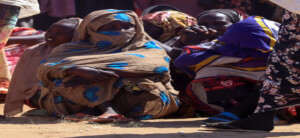Rape of displaced women in North Darfur on the rise
The Strategic Initiative for Women in the Horn of Africa, SIHA Network, announced a 50 per cent increase in rapes of displaced women in El Fasher. There is an increase in urinary fistula among girls as a result of sexual violence as well.
 Participants of a SIHA Network meeting earlier this year (SIHA)
Participants of a SIHA Network meeting earlier this year (SIHA)
The Strategic Initiative for Women in the Horn of Africa, SIHA Network, announced a 50 per cent increase in rapes of displaced women in El Fasher, capital of North Darfur. There is an increase in urinary fistula among girls as a result of sexual violence as well.
SIHA Network bases its announcement on data of the Saudi Hospital in El Fasher.
It states that displaced women are forced to leave the camps in search of a livelihood, which exposes them to violence from militias and armed security forces, that move around the cities, villages and camps in North Darfur unchecked.
SIHA issued its statement on the occasion of the International Day against Sexual Violence in Conflict Zones, June 19. The network demands criminalisation of sexual violence in conflict areas, and ratification of the Convention on the Elimination of Discrimination against Women (CEDAW) and the African Protocol on the Rights of Women.
Most of the women in the Abushouk, El Salam, and Rwanda camps, and in Tawila locality, work in the informal sector, selling food and beverages, or agricultural products. They also work as construction workers who make bricks or cultivate farms.
The precautionary measures imposed by government authorities to prevent the spread of coronavirus, put an end to selling food and beverages. High prices of seeds and raw materials in the brick industry made work in that part of the informal sector difficult.
SIHA concludes that the coronavirus precautions in North Darfur strengthened the position of the military in the state.
The network emphasises that “the pain of women in conflict areas remains a reality”, and an urgent matter that deserves attention and response as the government intents to bring peace.
Targeting human and women’s rights activists with ‘a campaign of arbitrary arrests in Darfur’ has affected the attention given to women’s issues by the judicial authorities, and women’s access to necessary health services and psychological support.
SIHA Network further states that peace can only be reached if there is rule of law, and police, prosecutors, and courts can do their jobs. Perpetrators must be held accountable, North Darfur must be ruled by civilians, and a legislative council should be set up as soon as possible. Clear visions on security arrangements and disarmament programmes must be developed.
The peace negotiations conducted by the Sudanese government and the rebel movements, “will not lead to an actual peace that transcends the paper it is written on, if there is no real involvement of women affected by the wars”. Transitional justice will not take place without the participation of women, youth and various grassroot civil society institutions, says SIHA.
The illustration to this article is a page from a report of a SHIA conference held earlier this year. The full report can be found and downloaded here.
Radio Dabanga’s editorial independence means that we can continue to provide factual updates about political developments to Sudanese and international actors, educate people about how to avoid outbreaks of infectious diseases, and provide a window to the world for those in all corners of Sudan. Support Radio Dabanga for as little as €2.50, the equivalent of a cup of coffee.












 and then
and then